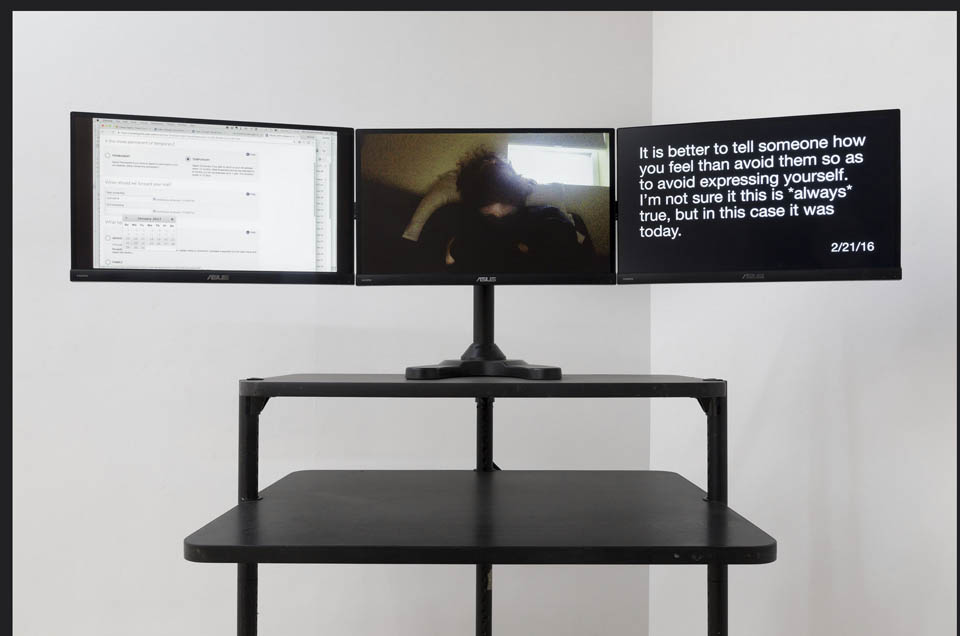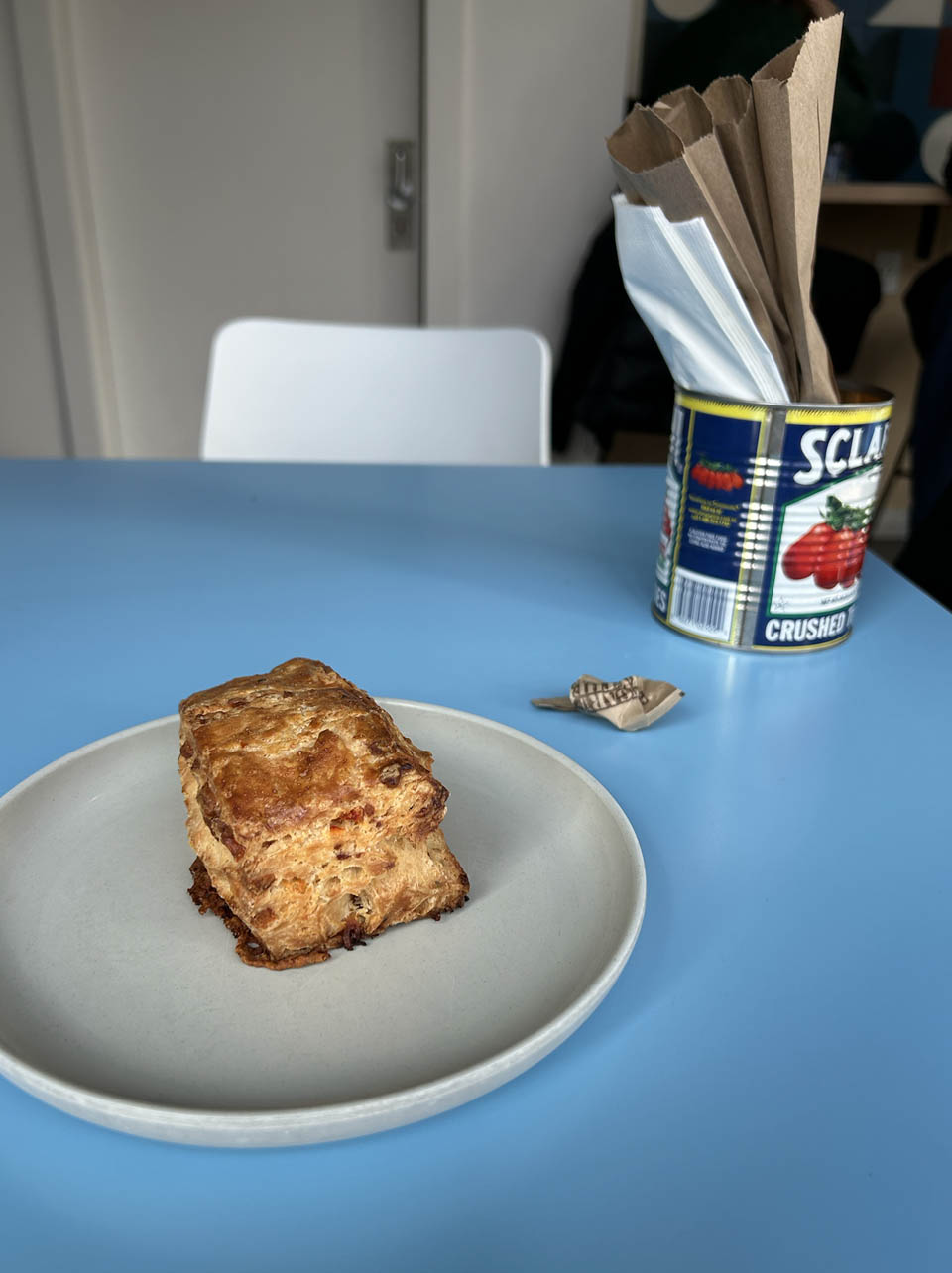Alex: Michael, we were having tea together as friends, but you are an exceptionally wise interlocutor in regards to the updated protocols of my blogging project where I’m talking to people about how we serve and feed each other as audiences, or witnesses, online and off, to each other’s experience and art. Given your body of work on the quantified digital self, labor, knowledge, and justice combined with the nature of this specific encounter during a period where you need embodied care, I am eager to talk to you about the audiences we make, find, and need.
My self-proscribed and short-term blogging practice during the interval between election and inauguration is producing frameworks for me to get by in this period by putting myself into all kinds of “audiences” so as to live, learn, and then try to understand the unique affordances of being together with intention. Here with you now, over tea and pastries, I understand that I’m in a new kind of audience yet again: to your need and to your work as a careprovider, given that your partner is ill and undergoing a very difficult treatment regime.
Michael: I think that you have a fairly unique kind of intellectual, personal, and emotional positionality to be my interlocutor at this moment, given your deep and longstanding commitment to thinking about caregivers and illness through your work on AIDS and Long COVID, and our shared project of teaching together during COVID lockdown (when my partner was in treatment for the first time). That frames our conversations, or not frames, but precedes our conversations and enables you to ask questions that are maybe more knowledgeable or sophisticated than I think my average interlocutor or audience, so to speak, can do. Because a lot of what I need right now is just trying to talk to and be around people, not being just totally removed from everything which was what happened during previous cycles of chemo like the one we are embarking on again right now.
During chemo, you need to talk to people, to feel seen not just as a body that’s doing work for another body. Some of it is about talking things out, and some of it is about learning, and it’s also about validation. The talking things out is just a need. I need to think out loud. I need to say stuff. I do that with you. I do that with my parents. I do that with my other friends. I do that with my therapist. And it’s weird the way that in this moment all of my conversations become a little bit more like my conversations with my therapist in that this one big thing is overwhelming everything in my heart. And it’s almost like you are truly an audience: you’re there just to ask the prompt and then listen and let me just talk.

But I think there’s also a learning process that can happen where there’s a reflection back from the “audience.” There have been a moments in our conversations over the last few months, since my partner Jackie was diagnosed with a recurrence of their cancer, where you were able to ask a question or highlight something I said that helped me understand some more big-picture things by virtue of your experience as a careprovider. And then, in terms of validation, there’s been moments when you’re like, “this sounds like it’s as healthy as it could be,” or “it sounds like you are all dealing with this really well.” And my mother can say that, but there’s a very decent chance that she’s saying that just to make me feel better, although she’s pretty honest with me.
This is different territory for you and me. When you’re saying I’m doing okay—because of my knowledge of your history as a thinker and as a doer—I believe that it is based off of access to experience and knowledge I couldn’t have without your feedback. And you’re very honest. You say what you think, and you wouldn’t say things to me if you didn’t believe it. So your words carry weight and they are a meaningful validation. In that sense, you’re an audience that talks back. Maybe that’s applause.
But in terms of the politics in this interval, they are an added stressor. I feel like I can do nothing about politics because I’m so busy dealing with this other thing with Jackie which is shadowed by a sort of slow-motion train wreck that is our political situation.
Alex: Thank you, Michael. I am committed to dialogic situations, conversations, reciprocal interactions. Just so, I thank you for helping me name a set of skills that I have learned, beginning in my 20s, when people around me were very sick and dying with HIV/AIDS. My current work with the What Would an HIV Doula Do? collective continues to educate me about caring for others who are ill and for the careprovider, too. The person giving care is a complex and multifaceted human being who wants to talk about their care giving and also their life as themselves. They want to joke about the weather, and they also want to talk about art making, and politics, and tea. All of that is helpful, but so is focusing on the caregiving itself. People are very afraid to do that and try to be tender footed, hesitant to notice or talk about how awful and difficult it is when someone you love is sick.
Is there anything you want to say about this hard interval that you are in, given my project’s focus on that deep, complex, and lush timescape?
Michael: I think of this time as sets of cycles. The interval that I’m in with Jackie is three weeks that repeats itself six times, but then that’s part of a larger interval because this is round two. And that is what I know. I don’t even know what day the inauguration is because I know when Jackie’s next infusion is, and it’s on the 13th of January, and then the second one is on the 20th of January.
Alex: The 20th of January is the inauguration.
Michael: Right. But that’s not what I’m thinking about. I’m thinking it’s the second infusion for this cycle. And it’s not so much like that the personal trumps the political so much as more of a Maslow’s hierarchy. It’s more that survival trumps the political.
Alex: A lot of people in this interval leading to the inauguration seem to be reacting as if we are encountering the most basic level of Maslow’s principles, as if we are ourselves are physically or medically threatened by what is coming. Of course, we are gravely concerned about our friends or family members (or those of us ourselves) who at most immediate risk: people who are trans, those in our community who are immigrants, really all who are are facing impending escalations of physical and legal threats to safety and well-being. But I think many of us who are safe enough, currently, are responding to this interval as if we are dealing with or preparing for physiological threats ourselves.
Michael: And the response is to withdraw to focus on …
Alex: … day-to-day survival. And part of my project about audiences—being in the world and feeding myself in alignment with art, community, and other people—is to resist what has been a tendency in the interval: to cocoon.
Michael: I’m already withdrawn, so I can’t give you any guidance on whether other people are too because I’m busy trying to reach out to other people just to stay afloat emotionally. I’m maybe not the best person to answer that.
Alex: Oh, you are. I’m glad to have tea with you. And I will continue to do so over all of the next cycles of care..

Comments
2 responses to “cycles of care in the interval”
[…] four times in just about as many days (also, Gavin McCormick on one’s partner as audience and Michael Mandiberg on being witnessed by a friend in times of need). Thinking abut it, I guess it’s not not that […]
[…] The interval that I’m in with Jackie is three weeks that repeats itself six times, but then that’s part of a larger interval because this is round two. And that is what I know. I don’t even know what day the inauguration is because I know when Jackie’s next infusion is, and it’s on the 13th of January, and then the second one is on the 20th of January. [Alex replies: The 20th of January is the inauguration.] – Michael Mandiberg, cycles of care in the interval […]